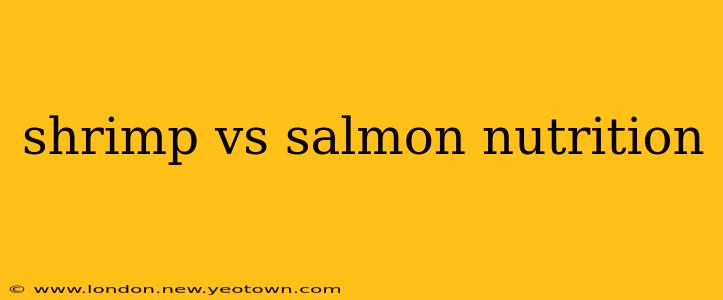The seafood aisle can be a bewildering place. Do you grab the vibrant pink salmon or the delicate, pearly shrimp? Both are excellent sources of protein and offer a range of health benefits, but which reigns supreme in the nutritional battle? Let's dive into a detailed comparison to help you make the best choice for your diet.
Imagine this: you're at the grocery store, torn between a package of succulent shrimp and a fillet of rich salmon. Both promise a delicious meal, but which one will better nourish your body? This isn't just a culinary question; it's a nutritional puzzle with some surprising answers.
What Makes Shrimp a Nutritional Powerhouse?
Shrimp, those tiny crustaceans, pack a mighty punch. They're a lean protein source, meaning they're low in fat and calories, making them a fantastic addition to weight-management plans. But it's not just about the protein; shrimp are also rich in:
- Selenium: This essential mineral is crucial for thyroid function and acts as a powerful antioxidant, protecting your cells from damage. A serving of shrimp provides a significant portion of your daily selenium needs.
- Vitamin B12: Important for nerve function, DNA synthesis, and red blood cell formation, vitamin B12 is abundant in shrimp and often lacking in vegetarian diets.
- Choline: This nutrient plays a critical role in brain health, liver function, and reducing inflammation. Shrimp offer a good source of choline.
- Iodine: Essential for thyroid hormone production, iodine is another nutrient readily available in shrimp.
Are Shrimp High in Cholesterol?
This is a common concern. While shrimp do contain cholesterol, the impact on blood cholesterol levels is often debated. Current research suggests that dietary cholesterol has less of an effect on blood cholesterol than previously thought, particularly for healthy individuals. However, those with high cholesterol should still monitor their intake.
Salmon: The Omega-3 Champion
Salmon, on the other hand, is celebrated for its high content of omega-3 fatty acids, specifically EPA and DHA. These healthy fats are crucial for heart health, brain function, and reducing inflammation throughout the body. Beyond the omega-3s, salmon also boasts:
- Vitamin D: Essential for calcium absorption, bone health, and immune function. Salmon, especially wild-caught, is a great source of vitamin D.
- Astaxanthin: This powerful carotenoid is responsible for salmon's pink color and is a potent antioxidant, fighting against cell damage and inflammation.
- Potassium: An important electrolyte that helps regulate blood pressure and muscle function.
Wild-Caught vs. Farmed Salmon: A Nutritional Distinction
It's crucial to note the difference between wild-caught and farmed salmon. Wild-caught salmon generally contains higher levels of omega-3s, vitamin D, and astaxanthin. Farmed salmon can be lower in these beneficial nutrients and may contain higher levels of certain contaminants.
Shrimp vs. Salmon: Which is Better for You?
The "better" choice depends on your individual needs and preferences. Shrimp is a great option for those looking for a lean protein source packed with essential nutrients, particularly selenium and B12. Salmon, especially wild-caught, shines with its high omega-3 fatty acid content and other vital nutrients like vitamin D.
Frequently Asked Questions
Which has more protein, shrimp or salmon?
Both shrimp and salmon are excellent sources of protein. The protein content varies slightly depending on the type and preparation method, but generally, they are comparable.
Is one better for weight loss?
Both can be incorporated into a weight loss diet. Shrimp tends to be lower in calories and fat, making it a slightly better choice for those strictly counting calories. However, the healthy fats in salmon can contribute to satiety and help regulate appetite.
Which is healthier for heart health?
Salmon has a clear advantage due to its high content of omega-3 fatty acids, which are known to support heart health by reducing inflammation and improving blood lipid profiles. Shrimp contributes to heart health through its various nutrients, but the omega-3 boost from salmon makes it a stronger contender in this category.
Are there any potential downsides to eating too much shrimp or salmon?
While both are nutritious, consuming excessive amounts of any food can have drawbacks. Some individuals may be allergic to shellfish, including shrimp. High mercury levels can be a concern in some types of salmon, especially larger, older fish. It's always best to choose sustainable and responsibly sourced seafood.
In conclusion, both shrimp and salmon are valuable additions to a healthy diet. The best choice depends on your individual dietary needs, preferences, and health goals. Enjoying a variety of seafood will ensure you reap the benefits of both!

